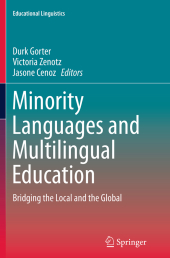 Neuerscheinungen 2016Stand: 2020-02-01 |
Schnellsuche
ISBN/Stichwort/Autor
|
Herderstraße 10
10625 Berlin
Tel.: 030 315 714 16
Fax 030 315 714 14
info@buchspektrum.de |

Jasone Cenoz, Durk Gorter, Victoria Zenotz
(Beteiligte)
Minority Languages and Multilingual Education
Bridging the Local and the Global
Herausgegeben von Gorter, Durk; Zenotz, Victoria; Cenoz, Jasone
Softcover reprint of the original 1st ed. 2014. 2016. xi, 220 S. 12 SW-Abb., 10 Farbabb. 235 mm
Verlag/Jahr: SPRINGER NETHERLANDS; SPRINGER 2016
ISBN: 9401779988 (9401779988)
Neue ISBN: 978-9401779982 (9789401779982)
Preis und Lieferzeit: Bitte klicken
This book presents research on the situation minority language schoolchildren face when they need to learn languages of international communication, in particular English. The book takes minority languages as a starting point and it bridges local and global perspectives in the analysis of multilingual education contexts. It examines the interaction of minority languages and cultures, majority languages and lingua franca-s in a variety of settings across different regions and countries on all continents. Even though all chapters in this book involve minority languages, the issues discussed are relevant to any context in which more than language is used in education.
The book reveals challenges and opportunities of multilingual education by discussing issues such as Northern and Southern concepts, language education policies, language diversity, interethnic understanding, multimodal language practices, power, conflict, identity and prestige, among many others.
"This is the volume that finally accounts for multilingual education from a truly multilingual perspective by involving proposals and research from a variety of multilingual speech communities in the world. The (linguistically) rich Ethiopia and Mexico can teach the poor Europe and other Northern countries about multilingual education. CLIL promoters may learn from Finnish Sámi and Canadian Innu and Mi´gmaq indigenous communities as well as from Basque results. Speakers and teachers of minority and international languages will certainly be glad to hear the news. There is no need for a monolingual bias or tunnel vision in acquiring English in non-English speaking communities. This volume includes new challenging pedagogical perspectives while pointing to interesting conclusions for worldwide educational authorities". Maria Pilar Safont Jordà, Universitat Jaume I, Castelló, Spain
1 Durk Gorter, Victoria Zenotz and Jasone Cenoz - Introduction: minority language education facing major local and global challenges.- 2 Carol Benson - Adopting a multilingual habitus: What North and South can learn from each other about the essential role of non-dominant languages in education.- 3 Bob Adamson and Anwei Feng - Model for trilingual education in the People´s Republic of China.- 4 Kathleen Heugh - Margins, diversity and achievement: System-wide data and implementation of multilingual education in Ethiopia.- 5 Siew Kheng Catherine Chua - A new model of bilingualism for Singapore: Multilingualism in the 21 st century.- 6 Mela Sarkar and Constance Lavoie - Language education and Canada´s Indigenous peoples.- 7 Muhammad Amara - Policy and teaching English to Palestinian students in Israel: An ecological perspective to language education policies.- 8 Indika Liyanage and Suresh Canagarajah - Interethnic understanding and the teaching of local languages in Sri Lanka.- 9 Sari Pietikäinen and Anne Pitkänen-Huhta - Dynamic multimodal language practices in multilingual indigenous Sámi classrooms in Finland.- 10 Richard Hill & Stephen May - Balancing the languages in Maori-medium education in Aotearoa/New Zealand.- 11 Mario E. López-Gopar, Narcedalia Jiménez Morales and Arcadio Delgado Jiménez - Critical classroom practices: Using "English" to foster minoritized languages and cultures in Oaxaca, Mexico.- 12 Durk Gorter, Victoria Zenotz, Xabier Etxague, Jasone Cenoz - Multilingualism and European minority languages: The case of Basque


